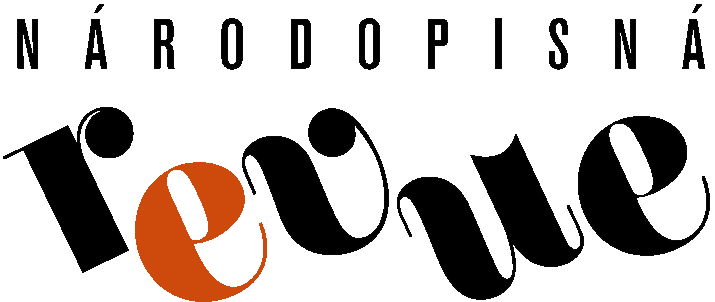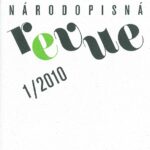Journal of Ethnology 1/2010 is aimed at the issue of Czech minorities living abroad; it submits also some knowledge from the researches among the Slovaks in Hungary. Michal Pavlásek (Czech minority in the South Banat village of Veliko Srediště. Its beginnings and ethic processes) dealt with forming of Czech settlement in the region of present Serbian Banat. Stanislav Brouček (History and memories of the own past /with respect to testimonies of Czech immigrants to the Republic of South-Africa/) investigated the role of group and individual memory at Czech Diaspora. Petr Janeček (Literary folklore of Texas Czechs. On narrative repertoire of Czech emigration groups in the first half of the 20th century) paid attention to oral tradition at Czech minority in Texas. Markéta Janková and Tomáš Čech (Czechs abroad - trans-generational transfer of Czech folk culture among the members of fellow-countrymen associations) dealt with the activities of fellow-countrymen associations, while Eva Krekovičová (There are anthems and anthems. Anthems in the processes of transformation at the turn of the Millennium) investigated the self-identification of Slovak minority in Hungary.
Stopping with Photos submits the photos of events in the families of Czech immigrants to the USA, the Transferring Trandition column publishes the contribution by Magdalena Rychlíková about Ludvík Feigl (1861-1942), a significant Czech entrepreneur, collector and organizer of cultural life, who was working in Lvov in Eastern Halič for fifty years, and the commemoration of the work of writer Marie Damborská (1895-1990) written by literary scholar František Všetička. Social Chronicle remembers the anniversaries of Slovakian ethnologist Daniel Luther (born 1950) and Hungarian ethnologist of Slovakian origin Anna Divičanová (born 1940). It publishes also the obituary notes of Hungarian ethnologist Soňa Kovačevičová (1921-2009) and Czech ethno-musicologist Ivo Stolařík (1923-2010). Other regular columns pay attention to conferences, exhibitions, festivals reviews of new books and reports from the branch.
Veliko Srediště - interpretation of transmigration and ethogenesis of the Czech speaking inhabitants by 1918
Veliko Srediště is a settlement situated in Serbian Banat, in Voivodina, near the town of Vršac. This contribution tries to find an answer to the issues relating to ethnogenesis of the Czech speaking inhabitants, who have been neglected by ethnologists, anthropologists, or historians researching the Czech speaking communities abroad. The contribution is based on the new hitherto not used resources provided by the archive of the Synodic Council in Prague as well as by the Regional History Archive in the village of Bela Crkva. The author discovered other important resources in the location concerned where he did large field research work. Taking into consideration those resources, one can refute the theses on ethnogenesis of Czechs in Veliko Srediště. Such theses assert Protestants from Svatá Helena, a Czech village in Rumania founded after 1820, to have been the first Czech colonists. In his contribution, the author interprets transmigration of the Czech speaking inhabitants as the process of migration consisting of three compact colonization waves reaching their peak with the large “Moravian” colonization wave in the 1850s. He records the historical development of Protestants since the end of the World War I, trying to explain the assimilation of Czech Roman Catholics within a larger group of German Roman Catholics.
History and memories of the own past /with respect to testimonies of Czech immigrants to the Republic of South-Africa/
Memory can be compared to the function of a balance wheel creating continuity in different areas of the society. History and memory are two different categories. History can enter memory; on the contrary, memory entry into history is an inadmissible matter for some historians; for other experts, the memories are adequate history resources. Subjective level of manipulation is what continues to be memory base. On the contrary, history is – to the maximum extent possible – an objectified view of the past. Memory records the past through individual experiences whereby several levels can be seen in the process of remembering. Especially: memory includes both a stage of a storage device and a stage of subjective interpretation depending on plenty of individualized factors including the current mood of the narrator. Both levels (storage device and interpretation), however, are subject to the author’s license whereby the purpose of this communication is dominating. On the other side, the purpose cannot be related only to an individual’s profit. The contribution summarizes some knowledge of the author gained at the collection of life stories among the members of Czech ethnic groups abroad with concrete examples from the Republic of South-Africa.
Literary folklore of Texas Czechs. On narrative repertoire of Czech emigration groups in the first half of the 20th century
Literary folklore, traditional, orally-transmitted level of expressive culture, is generally considered to be a important part of culture of all ethnic groups, including European immigration to the U.S.A. Presented paper examines folkloric level of everyday culture of Texas Czechs in the first half of the 20th century. Since immigration of first Czech families to Texas to the end of the Second World War, Texas Czechs represented vital ethnic oral culture with many specific folkloric characteristics. Although majority of oral narratives of Texas Czechs in this period were directly transferred from the Old Country, some of them were influenced by immigrant and pioneer experience, different social and cultural conditions in Texas, and contacts with other Texan ethnic communities. Only the most vital European traditions, which could be adapted to the new lifestyle, survived acculturation to specific American geographical, social and cultural setting. Presented first part of the paper, using mainly yet unpublished 1942 thesis “Czech Folklore in Texas” by Olga Pazdral from Central Texas, tries to point out some general outlines of Texas Czech literary folklore of this period, focusing mainly on folk legends. Planned second and third part will outline other traditional narratives (folktales, short folklore genres like jokes and proverbs, children folklore and personal experience narratives). Folklore of Texas Czechs of the period can be characterized not only by its continuity with Old World traditions, but also by its incorporation of typically American folklore narratives, stemming from unique immigration experience.
Czechs abroad - trans-generational transfer of Czech folk culture among the members of fellow-countrymen associations
The essay deals with features characteristic for the emigration of Czech expatriates abroad, in several migration waves. It records the role of fellow-countrymen associations, the trans-generational transfer of Czech traditions, and the safeguarding of Czech culture among the members of fellow countrymen associations and their descendants round the world. The authors submit descriptive results from a questionnaire research running in the years 2007 and 2008 (stress was put especially on the forms of trans-generational transfer and the influence of original cultured on the respondents' self-conception). The above research confirmed high influence of original cultural roots on the self-conception of Czech expatriates and their descendants, who took part in the research. Simultaneously, it drew attention to natural assimilation resulting in gradual abandonment of practicing the Czech traditional customs and the elements of Czech folk culture. Along with the “decline” of daily practicing, the trans-generational transfer in families, substituted by fellow-countrymen associations, gradually loses its influence on handing-over of the traditional components. The fellow-countrymen associations provide “education” and information for those interested (it is more a form of interest group); on the other hand, the expatriates could find here an alternative place to practice the Czech traditions, as mentioned above. Because ethnic identity is an important part of personal identity of an individual, the clubs - next to the family - are important not only for the entire communities but also for the individuals. Support provided by the Czech government to the clubs is therefore a significant contribution to their work.
There are anthems and anthems. Anthems with the processes of transformation at the turn of the Millennium
In her essay, the author deals with different levels of self-identification at members of Slovak language islands in Hungary, based on an example of more ethnically symptomatic anthems. On the one hand, it is the anthem of the Slovaks in Hungary, which became an official anthem of this minority in 1999. The Slovaks in Hungary accepted the melody of a carol generally spread in Slovakia to be their anthem. The text of this song comes from 1991 and it was written by V. Gruska, a Slovak involved in folklorism in Slovakia. It is the song Daj Boh šťastia tejto zemi publicized in the media also in Slovakia, but mainly as a Christmas carol. Based on the aforementioned example the author points out the different historical memory of the Slovaks in Hungary and of the Hungarians in Slovakia on one side, and that of the Slovaks living in Slovakia on the other side. While the Hungarians in Slovakia take the official Hungarian anthem for their own, the Slovaks in Hungary felt a need to have different anthem song, than the state anthem of the Slovak Republic. Within this environment, regional (“Pilíšská anthem”) and local anthems (“Čabianska anthem” from 1932) exist and return. The second part of the essay mentions a parody of the official Slovakia state anthem (Anthem of Unjustly Baldheaded) spread by the Internet as an anthem of an officially registered interest association.



